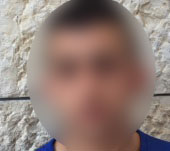Testimony: A.S.A.D.
| Name: | A.S.A.D. |
| Age: | 17 |
| Date: | 1 February 2018 |
| Location: | Qalqiliya, West Bank |
| Accusation: | Throwing stones |
On 1 February 2018, a 17-year-old minor from Qalqilya was arrested by Israeli soldiers from home at 3.30 a.m. and accused of throwing stones. He reports being denied his basic legal rights under Israeli military law. He reports being sentenced to 8 months in prison and fined NIS 3,000. He also received a suspended sentence.
 I woke up startled after hearing very loud banging at the front door at around 3:30 a.m. My father answered the door and about 20 Israeli soldiers entered our home. Two of the soldiers were masked.
I woke up startled after hearing very loud banging at the front door at around 3:30 a.m. My father answered the door and about 20 Israeli soldiers entered our home. Two of the soldiers were masked. The soldiers immediately pushed my father back and told him to sit down and not move. My mother told the commander he had an obligation to explain himself to us as to what he was doing in our house in the middle of the night. The commander completely ignored her.
The soldiers then went into my bedroom and I followed them. They asked me for my name and looked in my wardrobe but did not tell me why. Then they told me I was under arrest but did not say why. They gave my father a document asking him to go to Ariel police station.
I barely had time to say goodbye to my family before I was taken outside where a soldier tied my hands behind my back with two plastic ties on top of each other. The ties were very painful and left marks on my wrists for three days. I was also blindfolded. I was then taken to the back of a jeep where I sat on the metal floor and the jeep took me to Zufin military base.
At the base I was quickly examined by a doctor who removed the blindfold and the ties and put them back on when he was finished. He made me sign a document written in Arabic and Hebrew about my medical condition. Then I was taken to the police station in Ariel settlement where I spent many hours in an outdoor area without any food or drink. Then I was taken for interrogation.
The interrogator removed the blindfold and the ties. He was in civilian clothes and looked like a wrestler. He had a voice recorder and a camera in the room. He introduced himself but did not inform me of my rights. He turned the voice recorder on and asked me whether I knew why I was there. Then he told me my father was waiting outside and if I confessed he would allow me to see him. I later found out that soldier showed my father footage of clashes with soldiers and told him I was taking part but my father denied it.
Then the interrogator told me to be straightforward with him because he had no time for me. Then he showed me footage of clashes and wanted me to confess against myself and others. He made me watch a long video of clashes and wanted me to confess. Another interrogator joined and he played “good cop”, at least in the beginning. He asked me how I was doing.
Then the second interrogator blindfolded me and took me to the basement and asked me questions and wanted me to confess. Then he removed the blindfold and showed me pictures and wanted me to confess but I refused. He shouted at me each time he asked me to name someone in the pictures and I refused.
Then the second interrogator put the blindfold on again and tightened it and he also handcuffed me. Still I refused to confess. Then he took me upstairs. The first interrogator took over and repeated the same accusation. In the beginning I denied the accusation but the interrogator kept insisting that I must confess and in the end I did. He raised his voice at me each time I denied the accusation. He swore at god and told me I was giving them a hard time. I was tired, hungry and thirsty and couldn’t stand it any longer and I confessed to throwing two stones which missed based on some images. The interrogation lasted for about two-and-a-half hours.
After I had confessed the interrogator asked me whether I wanted to see a lawyer and I told him I did not; I did not appreciate the importance of having a lawyer at the time. Then I was photographed and fingerprinted and made me sign a document in Hebrew which I was told said I was informed of my rights.
Then I was taken to Huwwara military base where I arrived late at night and I was strip searched. I spent about two hours there and then I was taken to Megiddo prison, inside Israel. I arrived there at around 1:30 a.m. I was searched with my clothes on and I went straight to bed; I was exhausted.
The following day I was taken to Salem military court. The military judge extended my detention and the hearing was adjourned. I had six hearings and at the last one I was sentenced in a plea bargain to eight months in prison and fined NIS 3,000. I also received a suspended sentence of six months in prison valid for five years. I accepted the plea bargain because the punishment would have been harsher had I rejected it.
I spent my entire prison sentence at Megiddo prison where I studied Arabic and mathematics. My parents visited me three times, four months after my arrest. Their permit to visit me took a long time to be issued. I was released early for good conduct on 20 June 2018.





